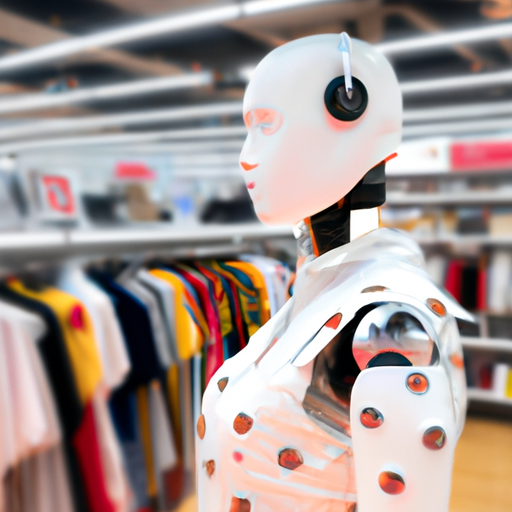
AI in Retail: How Artificial Intelligence is Reshaping the Industry
-
Table of Contents
- Introduction
- The Role of AI in Automating Retail Operations and Enhancing Efficiency
- How AI is Helping Retailers Personalize Shopping Experiences
- Leveraging AI to Improve Customer Service in Retail
- The Impact of AI on Retail Supply Chain Management
- Exploring the Benefits of AI in Retail: How AI is Transforming the Shopping Experience
- Conclusion
“Unlock the Power of AI in Retail: Transform Your Business with Smarter Solutions.”
Introduction
The retail industry is undergoing a major transformation due to the emergence of artificial intelligence (AI). AI is revolutionizing the way retailers interact with customers, manage inventory, and optimize operations. AI-driven technologies such as machine learning, natural language processing, and computer vision are being used to automate processes, improve customer experience, and increase efficiency. AI is also being used to analyze customer data and provide personalized recommendations. AI is transforming the retail industry by providing retailers with the ability to better understand customer needs and preferences, optimize operations, and increase sales. AI is reshaping the retail industry by providing retailers with the tools to better understand customer behavior, optimize operations, and increase sales.
The Role of AI in Automating Retail Operations and Enhancing Efficiency
Artificial Intelligence (AI) is revolutionizing the retail industry, providing retailers with the opportunity to automate operations and enhance efficiency. AI is being used to automate mundane tasks, such as inventory management, customer service, and marketing, freeing up time for employees to focus on more complex tasks. AI can also be used to analyze customer data and provide insights into customer behavior, allowing retailers to better understand their customers and tailor their services accordingly.
AI can be used to automate inventory management, allowing retailers to track stock levels and order new items when necessary. This helps to ensure that retailers always have the right amount of stock on hand, reducing the risk of overstocking or running out of items. AI can also be used to monitor customer service, providing automated responses to customer inquiries and helping to resolve customer issues quickly and efficiently.
AI can also be used to analyze customer data and provide insights into customer behavior. This can help retailers to better understand their customers and tailor their services accordingly. For example, AI can be used to identify customer preferences and suggest products or services that may be of interest to them. AI can also be used to identify trends in customer behavior, allowing retailers to adjust their strategies accordingly.
Finally, AI can be used to automate marketing tasks, such as creating targeted campaigns and optimizing ad spend. AI can also be used to analyze customer feedback and provide insights into customer satisfaction, allowing retailers to make improvements to their services.
In conclusion, AI is revolutionizing the retail industry, providing retailers with the opportunity to automate operations and enhance efficiency. AI can be used to automate mundane tasks, analyze customer data, and automate marketing tasks, allowing retailers to better understand their customers and tailor their services accordingly.
How AI is Helping Retailers Personalize Shopping Experiences
The retail industry is undergoing a major transformation, with the emergence of artificial intelligence (AI) playing a major role in the process. AI is helping retailers to personalize shopping experiences for their customers, allowing them to provide a more tailored and engaging experience.
AI-driven technologies are enabling retailers to better understand their customers’ preferences and behaviors. By leveraging data from customer interactions, AI can provide insights into customer preferences and buying habits. This data can then be used to create personalized shopping experiences, such as tailored product recommendations and targeted promotions.
AI can also be used to automate certain processes, such as product recommendations and customer segmentation. By automating these processes, retailers can save time and resources, while also providing customers with more relevant and personalized experiences.
AI can also be used to improve customer service. AI-powered chatbots can provide customers with quick and accurate answers to their questions, while also providing personalized recommendations. AI-powered virtual assistants can also be used to provide customers with personalized product recommendations and advice.
Finally, AI can be used to improve the overall shopping experience. AI-powered technologies can be used to analyze customer feedback and provide insights into customer satisfaction. This data can then be used to improve the customer experience, such as by making changes to the website or store layout.
Overall, AI is helping retailers to provide more personalized shopping experiences for their customers. By leveraging data from customer interactions, AI can provide insights into customer preferences and buying habits, automate certain processes, improve customer service, and improve the overall shopping experience. As AI continues to evolve, retailers will be able to further personalize the shopping experience for their customers.
Leveraging AI to Improve Customer Service in Retail
The retail industry is constantly evolving, and customer service is a key factor in the success of any retail business. As customers become more demanding and competition increases, retailers must find ways to improve their customer service. Artificial intelligence (AI) is one of the most promising technologies for improving customer service in retail.
AI can be used to automate customer service tasks, such as responding to customer inquiries and providing personalized recommendations. AI-powered chatbots can provide customers with quick and accurate answers to their questions, reducing the need for human customer service agents. AI can also be used to analyze customer data and provide personalized recommendations to customers, helping them find the products they need quickly and easily.
AI can also be used to improve the customer experience in stores. AI-powered cameras can be used to monitor customer behavior and provide insights into customer preferences. This data can be used to optimize store layouts and product displays, making it easier for customers to find what they need. AI can also be used to provide personalized recommendations to customers in-store, helping them find the products they need quickly and easily.
Finally, AI can be used to improve customer service by providing personalized customer support. AI-powered chatbots can be used to provide customers with personalized support, helping them resolve their issues quickly and efficiently. AI can also be used to analyze customer data and provide personalized recommendations to customers, helping them find the products they need quickly and easily.
AI is a powerful tool for improving customer service in retail. By leveraging AI, retailers can automate customer service tasks, optimize store layouts and product displays, and provide personalized customer support. AI can help retailers provide a better customer experience, leading to increased customer satisfaction and loyalty.
The Impact of AI on Retail Supply Chain Management
The impact of artificial intelligence (AI) on retail supply chain management is undeniable. AI has the potential to revolutionize the way retailers manage their supply chains, from inventory management to customer service. AI can help retailers optimize their supply chain operations, reduce costs, and improve customer satisfaction.
AI can be used to automate and streamline the supply chain process. AI-powered systems can analyze data from multiple sources, such as customer orders, inventory levels, and supplier information, to identify trends and patterns. This data can then be used to make informed decisions about inventory levels, pricing, and delivery times. AI can also be used to automate the ordering process, reducing the need for manual intervention.
AI can also be used to improve customer service. AI-powered chatbots can be used to answer customer queries quickly and accurately. AI can also be used to analyze customer feedback and identify areas of improvement. This can help retailers provide better customer service and increase customer satisfaction.
AI can also be used to improve the accuracy of forecasting. AI-powered systems can analyze historical data to predict future demand and adjust inventory levels accordingly. This can help retailers avoid overstocking or understocking, reducing costs and improving customer satisfaction.
In conclusion, AI has the potential to revolutionize the way retailers manage their supply chains. AI can be used to automate and streamline the supply chain process, improve customer service, and improve forecasting accuracy. By leveraging the power of AI, retailers can reduce costs, improve customer satisfaction, and increase their competitive advantage.
Exploring the Benefits of AI in Retail: How AI is Transforming the Shopping Experience
The retail industry is undergoing a major transformation, with artificial intelligence (AI) playing a key role in the process. AI is revolutionizing the shopping experience, making it more personalized, efficient, and secure. By leveraging AI-driven technologies, retailers are able to better understand customer preferences, optimize inventory management, and improve customer service.
AI-driven technologies are helping retailers to better understand customer preferences. AI-powered analytics can be used to analyze customer data and identify patterns in customer behavior. This data can then be used to create personalized shopping experiences, such as tailored product recommendations and targeted promotions. AI can also be used to analyze customer feedback and identify areas of improvement.
AI is also helping retailers to optimize inventory management. AI-powered analytics can be used to analyze sales data and identify trends in customer demand. This data can then be used to adjust inventory levels in order to ensure that the right products are in stock at the right time. AI can also be used to automate the ordering process, reducing the time and effort required to manage inventory.
Finally, AI is helping retailers to improve customer service. AI-powered chatbots can be used to provide customers with quick and accurate answers to their questions. AI-powered analytics can also be used to identify customer service issues and provide insights into how they can be addressed.
In conclusion, AI is transforming the retail industry, making it more efficient, secure, and personalized. By leveraging AI-driven technologies, retailers are able to better understand customer preferences, optimize inventory management, and improve customer service. As AI continues to evolve, the retail industry will continue to benefit from its many advantages.
Conclusion
AI in retail is revolutionizing the industry, allowing retailers to better understand their customers and provide them with personalized experiences. AI-driven technologies such as machine learning, natural language processing, and computer vision are enabling retailers to automate processes, improve customer service, and increase sales. AI is also helping retailers to better manage inventory, optimize pricing, and improve marketing campaigns. AI is transforming the retail industry and will continue to do so in the future.








